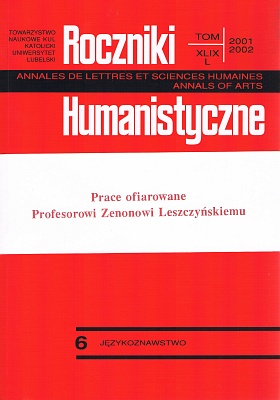Jeszcze o wykrzyknikach na, ne, nę i pochodnych od nich formach w znaczeniu `bierz, weź' lub `bierzcie, weźcie' w gwarach polskich
Abstrakt
In 1885 Jan Karłowicz published in Volume 1 of Prace Filologiczne a short article entitled „Wykrzykniki z końcówkami czasowymi” (“Interjections with Verbal Endings”), in which he noted, in particular, that the na, ne, nę interjections often take plural (or dual) verbal endings when the speaker addresses more than one person. This gives rise to such dialectal forms as: nacie, nata, necie, neta, namcie, nańcie...
In the present article, the author presents the geographical extent of: (1) the na, ne, nę interjections; (2) their forms augmented with the ż(e) particle and the dative of the pronoun ty (`you (singular)'), of the type naści, neści, naściże, neściże...; (3) forms used when addressing more than one person, composed of the na, ne, nę interjections and the second person plural or dual verbal ending, e.g., nacie, nata, necie, neta, nańcie, namcie...
Besides, the author attempts to explain the origin of these forms and their geographical extent.
Copyright (c) 2002 Roczniki Humanistyczne

Utwór dostępny jest na licencji Creative Commons Uznanie autorstwa – Użycie niekomercyjne – Bez utworów zależnych 4.0 Międzynarodowe.





